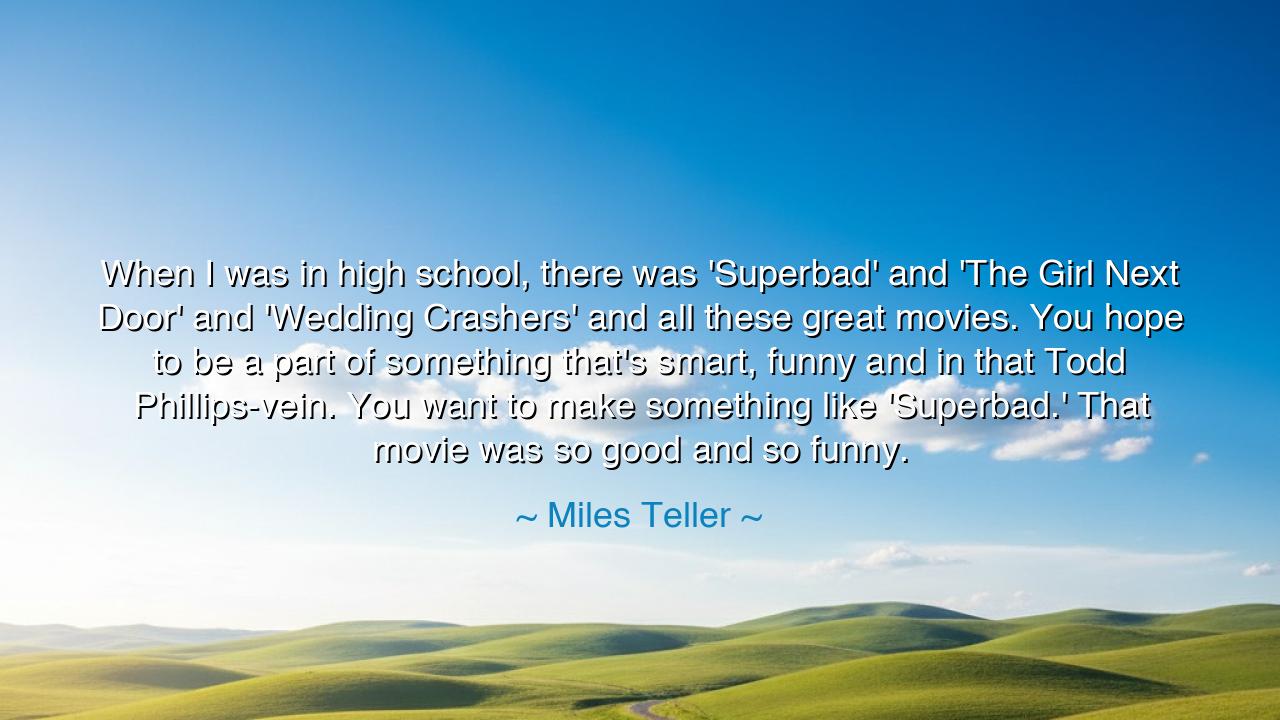
When I was in high school, there was 'Superbad' and 'The Girl
When I was in high school, there was 'Superbad' and 'The Girl Next Door' and 'Wedding Crashers' and all these great movies. You hope to be a part of something that's smart, funny and in that Todd Phillips-vein. You want to make something like 'Superbad.' That movie was so good and so funny.






In the words of Miles Teller, “When I was in high school, there was Superbad and The Girl Next Door and Wedding Crashers and all these great movies. You hope to be a part of something that's smart, funny, and in that Todd Phillips-vein. You want to make something like Superbad. That movie was so good and so funny.” — we hear not merely the admiration of a young actor for the films that shaped his generation, but the yearning of every artist who longs to create something lasting, something that captures the pulse of youth and the truth of life. Beneath the casual phrasing lies a timeless dream: the desire to join the lineage of creators who make people feel — to blend intelligence with laughter, depth with delight, art with authenticity.
The meaning of Teller’s reflection lies in his reverence for the balance between wit and wisdom, between comedy and truth. In naming films like Superbad and the works of Todd Phillips, he speaks of stories that were more than jokes — they were reflections of friendship, vulnerability, rebellion, and the awkward, beautiful chaos of becoming human. To create something “smart and funny” is no small task; it is to understand that laughter is not the opposite of meaning, but its messenger. Teller’s words reveal the artist’s eternal struggle — to entertain without emptying, to delight without deceiving, to make the audience laugh, but leave them thinking long after the laughter fades.
The ancients, too, honored this duality. The playwright Aristophanes of Athens wielded comedy like a blade, crafting works that amused the people but also challenged them. Beneath the laughter of his plays lay a mirror held up to society’s follies and truths. His art was “funny and smart,” as Teller might say — the laughter of enlightenment, not distraction. What Teller yearns for, knowingly or not, is to touch that same ancient vein of comedy as art — where the humor that entertains is also the humor that awakens. True comedy is not a mask for truth; it is the light that reveals it.
In Teller’s admiration for Superbad — a film about friendship, insecurity, and the clumsy transition to adulthood — there is more than nostalgia. He speaks as one who witnessed the power of storytelling to unite a generation. For every era has its comedies that define it: tales that capture not the grand triumphs of kings, but the small, ridiculous, heartfelt battles of ordinary people. Just as The Odyssey spoke to the wanderer and The Iliad to the warrior, films like Superbad and Wedding Crashers speak to the soul of youth — to the search for belonging, the joy of mischief, the sting of growing up. Teller’s longing “to make something like Superbad” is the artist’s cry to contribute to that lineage — to add his own flame to the fire of shared laughter that warms the human spirit across time.
The origin of his insight comes from a place familiar to all who pursue excellence: the humble recognition that greatness inspires imitation. Teller remembers the awe of his younger self — sitting in darkened theaters, watching characters come alive, their humor disguising the tenderness of truth. Those films were more than entertainment; they were blueprints of possibility. They taught him that humor could carry emotion, that laughter could be art. And so he dreamed not of fame, but of belonging — of someday creating something worthy of the laughter that had once inspired him. His reverence for Todd Phillips, known for blending comedy with social commentary, reflects this deeper aspiration: to honor the masters not by copying them, but by continuing their spirit.
There is, in this quote, a lesson for every seeker of greatness — artist or otherwise. We are all shaped by those who came before us, by the works, words, and deeds that lit our imaginations when we were young. But the wise do not simply imitate; they evolve. Teller’s words remind us to look back with gratitude and forward with purpose — to let inspiration become transformation. To desire to make something “smart and funny” is to aim for harmony — to create with both intellect and heart. Whatever your craft, strive for that same union: let your work move the mind, but never forget to touch the soul.
Therefore, my friends, take this truth to heart: admiration is the seed of creation, but authenticity is the bloom. Study the masters, yes — watch the Superbads and read the Aristophanes — but do not become their shadow. Let their influence awaken your own voice, your own truth. For the world does not need another copy of greatness; it needs the next original light. Miles Teller’s words are not only about film — they are about the longing within all of us to leave something meaningful behind, something that makes others laugh, reflect, and remember.
And so, as the ancients taught, the highest art is the one that unites joy and wisdom. In Teller’s yearning, we see the eternal fire of the artist’s heart — the hunger to make something that matters, something that will one day inspire another young dreamer sitting in a darkened theater, whispering to themselves, “I want to make something like that.”






AAdministratorAdministrator
Welcome, honored guests. Please leave a comment, we will respond soon